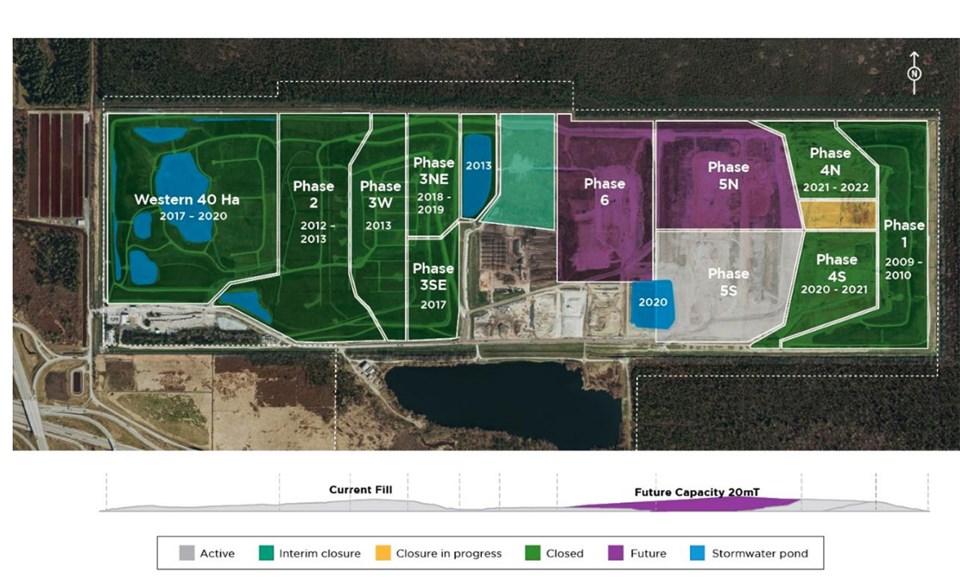The Â鶹´«Ã½Ó³»Landfill in Delta will be closing in 15 years.
Metro Vancouver, Delta and Â鶹´«Ã½Ó³»currently have a deal, signed in 1999, that stipulates the landfill is to close in 2037, a schedule the regional district has already indicated will not change as ongoing waste diversion initiatives continue.
The regional district last week announced the Metro Board of Directors has selected a 31-member Solid Waste Management Plan Public/Technical Advisory Committee to help guide the review and update of the region’s solid waste management plan, which sets out goals and objectives for waste reduction, recycling and management in the region.
Metro over a year ago began the process of reviewing its current Integrated Solid Waste and Resource Management Plan, last updated in 2011. The new committee will be in place for the duration of the plan update, which is expected to last two-to-three years.
Whatever the final recommendations, less waste ending up in the dump won’t mean its life expectancy will be extended.
When the region began stakeholder consultations last year, Paul Henderson, general manager of Solid Waste Services for Metro Vancouver, said the success of waste reduction, reuse and recycling efforts will reduce the region’s reliance on the Â鶹´«Ã½Ó³»Landfill, but there are no plans to extend use of the landfill beyond 2037.
Meanwhile, work by Vancouver, which operates the landfill, has already been underway on the site’s eventual closure. An end-use plan must also be developed that meets with Ministry of Environment and Climate Change Strategy's approval.
The landfill is authorized to accept up to 750,000 tonnes of municipal solid waste, including demolition waste, for disposal each year.
The City of Vancouver’s 2021 annual report on landfill operations notes that last November, due to the provincial state of emergency in response to severe flooding in B.C., the Memorandum of Understanding temporarily approved several changes.
Those changes included an increase to the maximum annual authorized discharge rate up to 825,000 tonnes for the 2021 calendar year, as well as the discharge of out-of-region waste until March 31, 2022, and the discharge of agricultural waste until Dec. 31, 2021.
In 2021, a combined total of 756,472 tonnes of waste were disposed at the landfill.
The report notes that amount consisted of 726,838 tonnes of municipal solid waste, of which 5,739 tonnes were out-of-region municipal solid waste and 356 tonnes were agricultural waste, as well as 29,635 tonnes of demolition waste.
That amount reflected approximately 71 per cent of the total municipal solid waste generated in Metro Vancouver, with the remaining 29 per cent delivered to the Burnaby waste-to-energy facility and out-of-region landfills.
As far as the eventual closure, the report notes that as each phase of the landfill is filled to its design height, it is closed using an engineered cover system. The cover system is designed to minimize leachate generation and maximize landfill gas capture.
Since 2009, the Western 40 Hectares as well as Phases 1, 2, 3 and 4 have progressively closed, with the exception of four hectares on the crest of Phase 4 North which was deferred to 2022.
This equates to closure of a total of 122.8 hectares, or 71 per cent of the 173 hectare projected waste footprint.
The remaining capacity of the Â鶹´«Ã½Ó³»Landfill, as of December 31, 2021 is 6,397,871 tonnes.
The City of Â鶹´«Ã½Ó³»is responsible to pay for closure and post-closure costs for Â鶹´«Ã½Ó³»and Delta waste.
At the end of 2021, 35.7 per cent of the total waste in place the landfill was regional waste, with the remaining 64.3 per cent originating from Â鶹´«Ã½Ó³»and Delta
When it comes to the future uses of the site once the landfill is closed, a consultant was retained last year to assist Â鶹´«Ã½Ó³»and Delta to develop suitable end use options for the site, supported by stakeholder engagement and technical feasibility analysis. It will be the first phase in the end use planning.
The first phase report is expected this fall.
